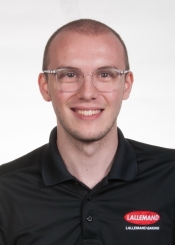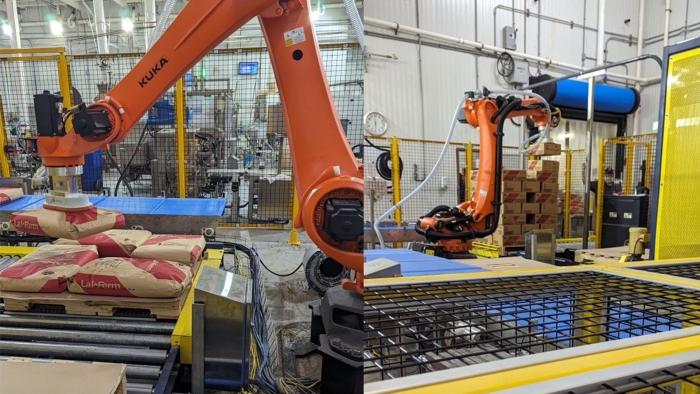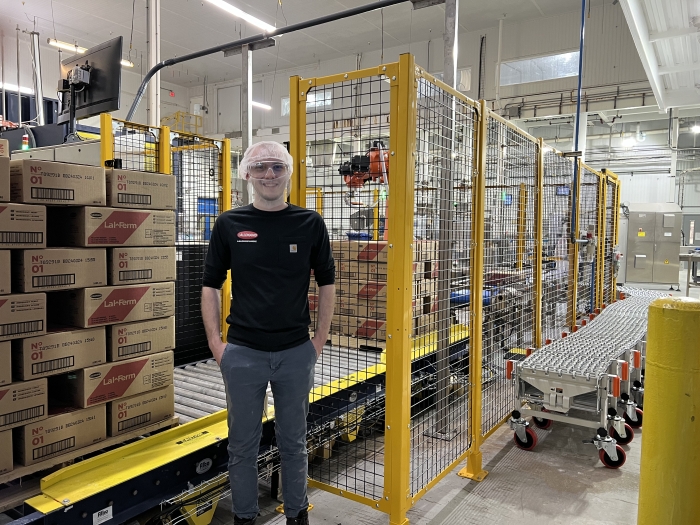A legend in the baking: ASU alum finds success with capstone project

Tyler Jiemback, a manufacturing engineer at Lallemand Baking and an Arizona State University alumnus, poses in front of Lallemand Baking’s newly installed robot he designed as part of his ASU senior capstone project. Photo courtesy Tyler Jiemback/Lallemand Baking
It's not every day a college student has the opportunity to participate in a $1.5 million funded capstone project.
For Tyler Jiemback, an Arizona State University alumni who graduated from The Polytechnic School, part of the Ira A. Fulton Schools of Engineering, in May 2022 with a Bachelor of Science in engineering, this daydream of an opportunity became a reality during his senior year of college when he and a team of other students participated in a capstone project in partnership with Lallemand Baking.
And it turned into a job — after completing his capstone, Jiemback was offered a full-time position at Lallemand Baking as a manufacturing engineer. This year, he finally saw his project — a finished robot — on the factory floor.
The capstone project is a culminating experience for students that can vary from writing a thesis to performances and exhibits. With many of the ASU undergraduate degree recipients participating, these projects explore skills in writing, oral communication, project management and hands-on research.
Senior capstones are recognized as transformative learning experiences, serving as high-impact projects that enable students to develop innovative solutions to challenges that may occur in professional settings. The completion of senior capstones showcases students' proficiency in the knowledge acquired at ASU and the practical implementation of their chosen area of study.
At the beginning of the capstone process, industry partners showcase their project proposals, offering students a glimpse into a real-world problem in need of a solution.
One presentation stood out to Jiemback above all others.
“Lallemand was a bit unique in that they went in knowing that they were looking for someone to hire full time, which was, admittedly, one of the main reasons I joined the project,” Jiemback says. “At the beginning of your senior year of engineering, the biggest hurdle you face isn't the class workload, it's securing your first post-graduation job.”
As a supplier of yeast and baking ingredient solutions, Lallemand Baking emphasizes an evolutionary approach by delivering value through its innovative baking solutions.
“We have large facilities in production all day long, 365 days a year, with a strong workforce embedded inside of them,” says Audrey St. Onge, president and general manager of Lallemand Baking, North America. “We don't like to call ourselves manufacturers; we’re more producers of a special ingredient.”
Lallemand Baking’s primary concern revolved around the manual palletizing process for both 50-pound bags and 40-pound boxes of dry yeast on the production line. The manual handling of these products posed risks of injury, operational inconsistencies and often led to high turnover.
“They wanted us to come in and evaluate their production line, see how we could optimize the entire product flow and then implement a new design for a new system,” Jiemback says.
Jiemback realized that the introduction of an automated palletizing system had the potential to comprehensively address these issues.
“One of my favorite parts of their proposal was how open-ended they left it," he says. "They left us a lot of room for autonomy, creativity and design, which really drew me to the project.”
During a capstone project, each student ranks their preferred projects and the program coordinators make matches based on skill set alignment. Together, Jiemback and his team worked through the project's design phase.
“Pretty much all of the work was done as a group,” he says. “It's really hard to do independent work since the capstone is such an interdisciplinary process.”
Throughout the project, Jiemback collaborated with Lallemand Baking to redesign the yeast production lines in the company’s factory. This included designing the layout, integrating a robotic palletizer and implementing real-time data systems.
“They put no restrictions on us," Jiemback says. "We were able to draw from a lot of the new technology we were exposed to during our degree at ASU and discover new ways to apply that technology without limitations, which was so fun.”
The primary objective was to enhance production output while minimizing the physical strain on factory workers.
“In simplest terms, we developed a new production line layout that improved and streamlined this process, allowing for an efficient product flow, consistent output levels and a lower labor cost,” Jiemback says.
This solution, however, was not without its challenges.
“Designing a system such as this can be easy, but making it work with all of the restrictions is difficult,” says Chuck Dulisse, vice president of engineering and asset management at Lallemand Baking. “With such limited space and the sheer speed of the equipment, finding a way to make one piece of equipment palletize three different assembly lines was not an easy feat.”
Jiemback adds, “I think one of the biggest challenges was maintaining consistent communication between Lallemand and the capstone team. We were very fortunate in that we got to collaborate with the upper management, but it was often difficult to carve out sufficient time to discuss our design.”
The one piece of advice Jiemback would give to students beginning their capstone project is to ask as many questions as possible. The more inquisitive you are, the better your project will turn out, he says.
“What I liked about Tyler is he wasn't afraid to ask questions,” St. Onge says. “He has leadership skills built within him. He truly shined out of the pack, and I knew he was a member of our team.”
Seeing the process unfold from start to finish was an incredibly rewarding experience for Jiemback.
“I was so proud of Tyler when I saw him standing beside the finished robot,” St. Onge says.
Today, Jiemback enjoys the diverse nature of his work at Lallemand Baking and he values having the freedom to explore and grow without fear of scrutiny.
“The value that capstones bring to companies is incredible,” St. Onge says. “I will continue to develop these kinds of partnerships and take opportunities to work hand-in-hand with students to help fuel new energy. It's a win-win partnership.”
With appreciation for where his Polytechnic capstone project has landed him, Jiemback looks forward to his bright future.
“As my career continues to unfold,” he says, “I hope to use my unique perspective to bring new technology and ideas into the manufacturing space.”
More Science and technology
Extreme HGTV: Students to learn how to design habitats for living, working in space
Architecture students at Arizona State University already learn how to design spaces for many kinds of environments, and now they can tackle one of the biggest habitat challenges — space architecture…
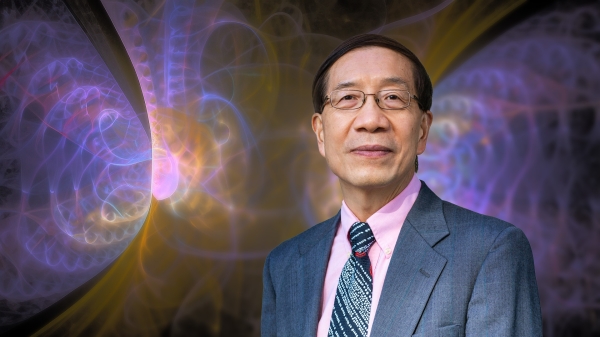
Human brains teach AI new skills
Artificial intelligence, or AI, is rapidly advancing, but it hasn’t yet outpaced human intelligence. Our brains’ capacity for adaptability and imagination has allowed us to overcome challenges and…
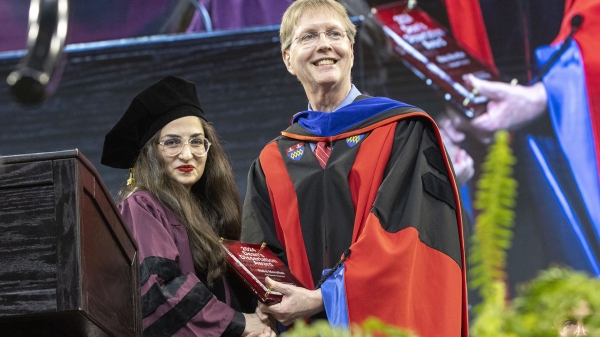
Doctoral students cruise into roles as computer engineering innovators
Raha Moraffah is grateful for her experiences as a doctoral student in the School of Computing and Augmented Intelligence, part of the Ira A. Fulton Schools of Engineering at Arizona State University…
